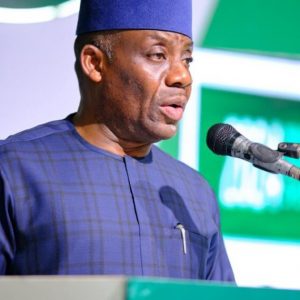Through much of the Goodluck Jonathan and early years of the Muhammadu Buhari administrations, the Nigerian government was forced to contend with repeated threats by privately-run oil marketing companies to either stop the importation of petrol, go on strike, or lay off thousands of workers over government’s inability to pay outstanding subsidy bills owed the companies. To ward off the attendant fuel scarcity and its crippling impact on the economy, the government was always forced to the negotiating table. It was irrelevant whetherfuel subsidy demands, often running into hundreds of billions of naira, were real or imagined. As a way of defraying their debts to marketers, both revenue-challenged administrations, after validating the subsidy claims, resorted to the issuance of promissory notes, following which marketers that were strapped for cash sold the notes to their banks at a discount, or waited till maturity for the Debt Management Office to redeem them at face value.
But all that’s behind us now. Or so we think. With full deregulation of the petroleum downstream sector in 2023, the federal government no longer has to kowtow to oil marketers, even as it struggles to unravel the N2.7 trillion subsidy claim from the Nigerian National Petroleum Company Limited, which it controls and in recent years became the sole importer of petrol into the country. Yet, while oil marketers may no longer cause government sleepless nights, another set of operators in the energy ecosystem are giving it heart palpitations and night sweats as it furiously ferrets for money to offset mounting subsidy claims from electricity generation companies (GenCos).
Today, the Nigerian government’s indebtedness to power GenCos ranges from N4 trillion to N5 trillion, and it has again found itself in the difficult position of cajoling GenCos not to turn off their plants and plunge the country into darkness. Like its predecessors, the Bola Tinubu administration just confirmed a bond programme to offset over N4 trillion owed GenCos. Speaking on the subject last Wednesday, Minister of Finance and Coordinating Minister for the Economy, Olawale Edun, said a proposal was submitted to the cabinet for the issuance of a bond to pay off government’s debt to the power companies. Of course, this means that the government will assume more debt and increase it fiscal deficit to appease the demands of GenCos. All this has happened because President Bola Tinubu has been selective in choosing just the downstream oil sector for full deregulation, while kicking the power sector can down the road.

To be fair, Tinubu is not the first and will probably not be the last president to bury his head in the sand as far as Nigeria’s electricity sector is concerned. Post-privatisation, Presidents Jonathan and Buhari lacked the political will to get the pricing regime right in the sector, thereby exacerbating illiquidity, stunting investment,and rendering most companies in the electricity value chain unviable. This in turn has led to structural changes in the power sector and compelled operatorsto come up with sustainable solutions for survival. One of such strategies is for GenCos to explore forward integration opportunities through the acquisition of electricity distribution companies (DisCos), especially those operating in high-value markets like Lagos, Abuja, Port Harcourt, and possibly Ibadan, Jos and Benin.
The first move towards the creation of a vertically integrated energy groupwas spearheaded by Sahara Group whose subsidiary Sahara Power Group (SPG) was visionary in its acquisition ofIkeja Electricity Distribution Company and the 1,320MW Egbin power station, both in Lagos under the privatisation programme in 2013. SPG was later to acquire additional thermal power plants in Omuku, Afam, Trans Amadi and Eleme, all in Rivers State.SPG along with its parent company’s ownership of Ashrami Energy’s upstream assets provide the perfect synergy for consolidating value for economic and product efficiencies.
After Sahara Group, Mainstream Energy Solutions Limited, owners and operators of Kainji and Jebba hydro power stations in Niger State, acquired Yola Electricity Distribution Company (Yola DisCo) through a subsidiary, Quest Electricity Nigeria Limited. Mainstream also opened discussions with Jos Electricity Distribution Company (Jos DisCo) in 2023 to supply electricity exclusively to the DisCo under a bilateral power agreement.
Then there is Transcorp Group’s power subsidiary, which already owns the 972MW Ughelli power plant in Delta State and 966MW Afam power station in River State butexpanded its energy footprint by buying 60% of Abuja Electricity Distribution Company (Abuja DisCo) last year. And now following promptly in Transcorp’s footsteps is the Transgrid Enerco consortium, whichis about to close a deal with its financiers to pay for a 60% stake in Eko Electricity Distribution Company (EKEDC).This is just as speculation is rifeof a possible hostile takeover bid by Amperion Power Distribution Companyof another DisCo and power station in the southwest region.Amperion is the owner and operator of Geregu Power Plc, which ischaired by Femi Otedola, who in recent years has emerged as Nigeria’sforemost corporate raider.
But while we wait to see if Amperion will make a move or not, Transgrid Enerco’s $227 million (N421.27 billion) bid for EKEDCshould provide more insight into whythis strategic push has become the norm and what this could portend for electricity consumers in those parts of Lagos and Ogun States covered by the DisCo.For one, EKEDC’s franchise area is quite diversified and is licensed across 1,200 square kilometres of southern Lagos comprising the Islands, Lekki, Ajah, Ibeju, Ijora, Apapa, Orile, Ajele, Mushin, Festac and Ojo. In Ogun, it serves Agbara. Owing to its coverage area, the DisCo provides electricity to the most cosmopolitan customer base in the country (about 736,000 customers in total). Accordingly, its customers account for Nigeria’s highest electricity demand per capita, and with rapid urbanisation and industrialisation in places like the Ibeju-Lekki corridor, demand is still expected to continue to grow.
Since its privatisation in 2013, EKEDC has expanded its network infrastructure to include over 6,000 distribution substations and 53 injection substations with an installed capacity of 4,430MVA. It has also invested in smart metering and automation to improve billing and collection efficiency. Furthermore, it is one of the few electricity distribution companies that consistently settles its market invoices for energy received from GenCos, has achieved significant revenue growth with a compounded annual growth rate of 30%, and is possibly the only DisCo that has recorded profits in four out of the last six financial years.
But even though it looks good on paper, EKEDC, like other DisCos, continues to be hampered by liquidity and technical constraints that impede its ability to fully deploy infrastructure, adequately meter its customers, and provide 24/7 electricity to them. A sizeable proportion of its Band A customers that are mandated to get 20 hours of electricity daily at the minimum, should count themselves lucky if they get up to four hours of electricity supply. While customers in lower service bands sometimes go for days or weeks without electricity.
Besides internal limitations and technicalconstraintssometimes arising from the Transmission Company of Nigeria (TCN), another reason EKEDC has struggled to meet electricity demand from its customers is due to the stark supply shortfall in the DisCo’s franchise area. Electricity demand in EKEDC’s franchise area is currently estimated at 4,597MW.However, it only gets 513MW from the transmission grid, resulting in a huge deficit of 4,084MW. This significant supply gap has forced many businesses and households to rely on self-generation – primarily using diesel – which is considerably more expensive at N950 per kWh (kilowatt-hour) and environmentally unsustainable.As such, Transgrid Enerco is likely to face an uphill task as it ventures into the electricity distribution space and takes on the onerous tasks of turning around EKEDC to provide reliable, innovative and sustainable energy services to its customers.
The challenges notwithstanding, the Transgrid consortium is made up of companies withdemonstrable track records in electricity generation, gas marketing and transportation, as well as infrastructure financing. According to information provided by EKEDC directors, Transgrid is made up of North South Power Company Limited, which holds an 80% stake in the consortium. North South Power owns and operates the 600MW Shiroro hydroelectric power station in Niger State, the 30MW Gurara hydroelectric power plant in Kaduna State, and a 20MW solar power project co-located within the Shiroro station. Other shareholders of Transgrid include Axxela Limited (formerly Oando Gas & Power), a leading energy solutions provider specialising in natural gas processing, distribution and power generation, and Stanbic IBTC Asset Management, fund manager of the Stanbic IBTC Infrastructure Growth Fund. Axxela and Stanbic IBTC Asset Management each hold 10% in Transgrid Enerco.
Add to this the passage of the Electricity Act in 2023, which has ushered in the regulatory tailwinds that Transgrid can ride on to improve operational autonomy and growth at Eko DisCo. For instance, the Act’s enabling framework provides for cost-reflective tariffs and operational autonomy for DisCos. It also paves the way for a flexible market structure by way of bilateral contracts between DisCos and GenCos which will ultimately drive growth. Transgrid could alsooptimise the Eko DisCo zip code that endows it with a large customer base with the capacity and ability to pay for electricity insofar as its available at all times. Should Transgrid in the foreseeable future also decide to decouple from the national grid by investing in a privately-run transmission grid in Lagos, not only will it redefine the power dynamics in Nigeria’s largest electricity market, it will serve as an industry point of reference.
But to achieve this,Transgrid must run EKEDC with the same discipline, efficiency, culture and customer focus as a bank. This must be backed by infrastructure upgrades, network expansion and metering programmes aimed at reducing losses and enhancing electricity delivery to its customers.To close the electricity supply gap in EKEDC’s francishe area,Transgrid would also have to pursue and implement embedded power solutions for high value customers, and at the same time secure long-term power purchase agreements with GenCos and other independent power producers at competitive rates.
In addition, Transgrid would do well by arming itself with a rigorous risk management framework to safeguard against regulatory risks likely to crystalise as sub-national governments move to take control of electricity markets in their states. Some of the issues that may arise in a state like Lagos, include carving up of EKEDC’s francishe area or the introduction of unhelpful rules and guidelines likely to hinder growth and investment.
A perfect example is the electricity market in Enugu State where the state electricity regulator slashed the Band A electricity tariff from N209 per kWh to N160 per kWh, sparking concerns about a hike in the subsidy shortfall and the state’s ability to pay the difference. With the uncertainty caused by the tariff reduction, which has the imprint of the state’s populist governor Peter Mbah all over it, the electricity distribution operator in Enugu – Mainpower Electricity Distribution Limited – has been forced to cut power supply to parts of the state. In a notice sent out recently, Mainpower blamed power outages in parts of the state to a significant drop in energy allocation from its parent company Enugu Electricity Distribution Company (EEDC). Mainpower said EEDC had determined that enforcing the tariff cut would lead to a monthly loss of N1 billion, making it impossible for it to meet its market obligations.
Ultimately, Transgrid’s takeover of EKEDC could not have come at a better time. The novelty of the Electricity Act and efforts by GenCos to find off-takers for the electricity that they produce are bound to enhance efficiency and create a more competitive market. Yet, concerns remain that EKEDC may be taking on too much debt by way of shareholder loans through the World Bank funded Distribution Sector Recovery Programme (DISREP) and the Siemens-led Presidential Power Initiative. Both loans, in addition to previous loans provided by the Central Bank of Nigeria to EKEDC and other DisCos continue to cause trepidation over a debt-equity conversion in the event any DisCo is unable repay its loans to government.
But such fears have been put to rest by industry experts who say EKEDC could always deleverage by listing on the Nigerian Exchange through an initial public offer. Although this may trigger a debate as to which of the two entities should be listed – EKEDC or Transgrid – there’s no doubt that whichever of the two is taken to the market, either of them will in the fullness of time create shareholder liquidity and long-term value.
Stay ahead with the latest updates!
Join The Podium Media on WhatsApp for real-time news alerts, breaking stories, and exclusive content delivered straight to your phone. Don’t miss a headline — subscribe now!
Chat with Us on WhatsApp






